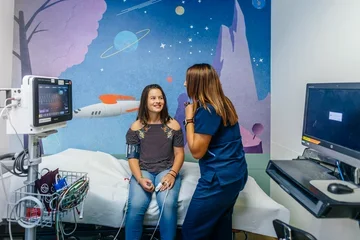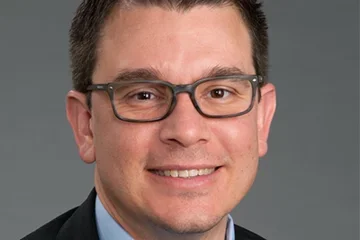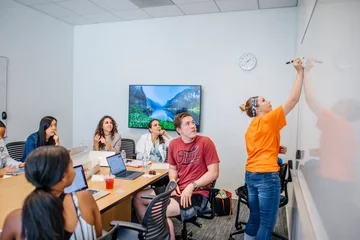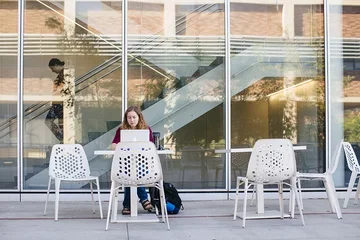A Student Athlete’s Inspiring Path to Medical School
UCLA Medical School Student Spotlight
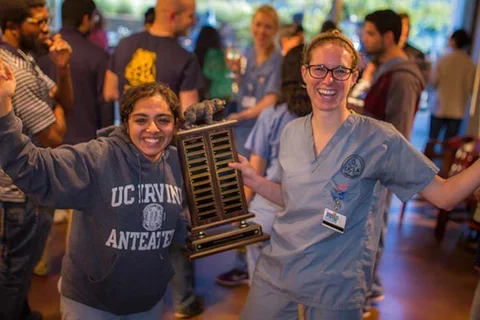
Team Sports Teach Skills That Position Athletes for Success
Taylor Hobson, MD, MBA, says his athletic experience did more than prepare him for medical school; it inspired him to apply.
When a torn meniscus sidelined the UCLA track and field athlete, he needed two surgeries. Dr. Hobson interacted a lot with orthopaedic surgeons in the year it took him to heal, and he reached a profound conclusion: He realized he wanted to do what they do.
Dr. Hobson talks about the benefits that student athletics bring to the medical school experience, and he offers advice for future students of the David Geffen School of Medicine at UCLA (DGSOM).
Balance
Growing up, Dr. Hobson played baseball, basketball, soccer and football, developing a particular talent for jumping along the way. His impressive records in the high jump and long jump earned him a spot on UCLA's Track & Field team.
His rigorous training schedule prepared him for his next big challenge: balancing the demands of medical school.
"Student-athletes have hectic schedules," he explains. "Training becomes a full-time job. So, I was used to having a lot on my plate."
Teamwork
Student athletics also offer camaraderie.
"The pre-med world can be cutthroat because it's all about the curve," Dr. Hobson says, but he recognizes that success in both medical school and clinical environments depends on teamwork. "It took time for some people to let go of that 'survival-of-the-fittest' mentality," he recalls. "But being part of sports teams made relationship-building second nature for me. Athletes know how to respect others and work together. On the field, people of different religions, races and upbringings have to come together for one goal."
Hobson believes the ability to build strong personal connections will also make him a good doctor. "Most student-athletes have been injured on the field. Being a patient in multiple clinical settings, you know when a doctor made you feel comfortable opening up and when one made you want to scream."
Empathy
As an orthopaedic surgeon-in-training, Dr. Hobson's personal experiences help him empathize with patients; he understands why they do things that might seem irrational to a physician.
"Athletes usually work out and eat healthier than others, but we're also very stubborn and don't always know when to stop," he says. "I tweaked my hamstring during my senior season. The UCLA trainers suggested sitting out for four-to-six weeks, but I kept jumping and didn't give it time to heal, and I still have occasional pain in that leg."
Confidence to Chase Dreams
After earning both his Doctor of Medicine from DGSOM and a Master of Business Administration from UCLA Anderson School of Management, Dr. Hobson remembers how he almost didn't apply to medical school.
"Athletes think you have to be the best at whatever you do," he explains. "It's really easy to feel like you're not good enough for med school. I decided to do medicine late. Everyone else had been volunteering in hospitals and doing research. Many of my classmates said without a 3.8 GPA and 40 MCAT score, I never would get in. I didn't have either, so I was discouraged."
Then he spoke to another former student-athlete—Brian Reemtsen, MD, a cardiothoracic surgeon at UCLA. "He said I was a great applicant and just needed to address my shortcomings," says Dr. Hobson.
Dr. Hobson began volunteering and conducting research to prove he was serious about medicine. "It's like a poker game," he suggests. "You can't change the hand you're dealt, but you can make the most of it. I am proof there is no cookie-cutter process to get into medical school. You don't have to be that biology major with a 4.0, three publications during undergrad and perfect MCAT scores. Schools like the David Geffen School of Medicine at UCLA aren't just looking at numbers. They're looking at the person."
(Related Article: Non Traditional Medical Student Finds Alternate Path to Med School)
